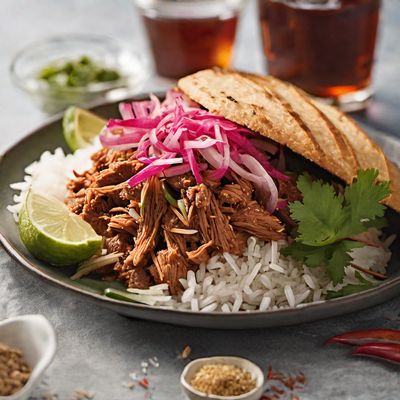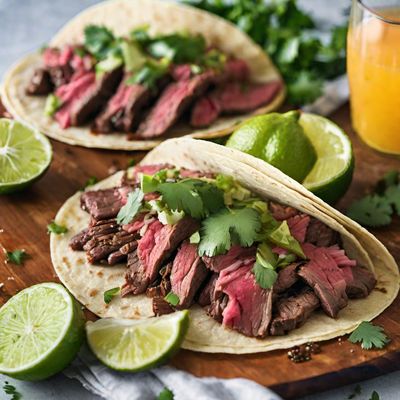
Recipe
Cochinita Pibil
Succulent Latin American Slow-Roasted Pork
4.8 out of 5
In Latin American cuisine, Cochinita Pibil is a beloved dish that originated in Mexico. This flavorful slow-roasted pork is marinated in a tangy citrus and achiote sauce, then wrapped in banana leaves and cooked to perfection. The result is tender, juicy meat with a hint of smokiness. Get ready to indulge in the rich flavors of Latin American cuisine with this mouthwatering Cochinita Pibil recipe.
Metadata
Preparation time
20 minutes
Cooking time
3-4 hours
Total time
4-4.5 hours
Yields
4 servings
Preparation difficulty
Medium
Suitable for
Gluten-free, Dairy-free, Paleo, Low-carb, Keto
Allergens
N/A
Not suitable for
Vegan, Vegetarian, Pescatarian, Nut-free, Egg-free
Ingredients
While the original Mexican Cochinita Pibil recipe remains true to its roots, the adaptation for Latin American cuisine incorporates regional variations in spices and cooking techniques. The flavors are still vibrant and the cooking method remains the same, but the spices used may vary slightly to reflect the diverse culinary traditions of Latin America. We alse have the original recipe for Cochinita pibil, so you can check it out.
-
2 pounds (900g) pork shoulder, cut into chunks 2 pounds (900g) pork shoulder, cut into chunks
-
4 cloves garlic, minced 4 cloves garlic, minced
-
1 tablespoon achiote paste 1 tablespoon achiote paste
-
1 tablespoon orange juice 1 tablespoon orange juice
-
1 tablespoon lime juice 1 tablespoon lime juice
-
1 tablespoon white vinegar 1 tablespoon white vinegar
-
1 teaspoon dried oregano 1 teaspoon dried oregano
-
1 teaspoon ground cumin 1 teaspoon ground cumin
-
1 teaspoon ground coriander 1 teaspoon ground coriander
-
1 teaspoon salt 1 teaspoon salt
-
1/2 teaspoon black pepper 1/2 teaspoon black pepper
-
1/4 teaspoon ground cloves 1/4 teaspoon ground cloves
-
1/4 teaspoon ground cinnamon 1/4 teaspoon ground cinnamon
-
2 bay leaves 2 bay leaves
-
Banana leaves, for wrapping (optional) Banana leaves, for wrapping (optional)
-
Sliced red onions and fresh cilantro, for serving Sliced red onions and fresh cilantro, for serving
Nutrition
- Calories (kcal / KJ): 350 kcal / 1465 KJ
- Fat (total, saturated): 20g, 7g
- Carbohydrates (total, sugars): 4g, 1g
- Protein: 36g
- Fiber: 1g
- Salt: 1.5g
Preparation
-
1.In a bowl, combine the minced garlic, achiote paste, orange juice, lime juice, white vinegar, dried oregano, ground cumin, ground coriander, salt, black pepper, ground cloves, and ground cinnamon. Mix well to form a marinade.
-
2.Place the pork shoulder chunks in a large resealable bag or a bowl. Pour the marinade over the pork, ensuring each piece is coated. Marinate in the refrigerator for at least 4 hours, or preferably overnight.
-
3.Preheat the oven to 325°F (160°C).
-
4.If using banana leaves, briefly pass them over an open flame to soften and make them pliable. Line a baking dish with the banana leaves, allowing them to hang over the edges.
-
5.Transfer the marinated pork and the marinade to the baking dish. Add the bay leaves. Fold the banana leaves over the pork, covering it completely. If not using banana leaves, simply cover the baking dish with aluminum foil.
-
6.Place the baking dish in the preheated oven and roast for 3 to 4 hours, or until the pork is tender and easily shreds with a fork.
-
7.Once cooked, remove the banana leaves or foil and discard. Shred the pork using two forks.
-
8.Serve the Cochinita Pibil on warm tortillas, topped with sliced red onions and fresh cilantro.
Treat your ingredients with care...
- Achiote paste — Achiote paste is a key ingredient in Cochinita Pibil, providing a vibrant red color and unique flavor. If you can't find achiote paste, you can make a substitute by combining equal parts paprika, cumin, and turmeric.
- Banana leaves — Banana leaves add a wonderful aroma and flavor to the dish. If you can't find banana leaves, you can use aluminum foil as a substitute. Just make sure to cover the pork completely to retain moisture.
Tips & Tricks
- For an extra smoky flavor, you can cook the Cochinita Pibil on a grill instead of in the oven. Just make sure to wrap it tightly in banana leaves or foil to prevent the marinade from dripping.
- Leftover Cochinita Pibil makes delicious tacos, burritos, or even a filling for empanadas. Store any leftovers in an airtight container in the refrigerator for up to 3 days.
- If you prefer a spicier version, add a chopped habanero pepper to the marinade. Adjust the amount according to your heat preference.
Serving advice
Serve the Cochinita Pibil on warm tortillas, accompanied by sliced red onions and fresh cilantro. You can also serve it with a side of rice and beans for a complete Latin American meal.
Presentation advice
To enhance the presentation, garnish the Cochinita Pibil with a sprinkle of fresh cilantro leaves and a squeeze of lime juice. The vibrant colors and aromatic flavors will make this dish a feast for the eyes and taste buds.
More recipes...
For Cochinita pibil » Browse all
For Mexican cuisine » Browse all
More Mexican cuisine dishes » Browse all

Salbute
Salbute is a traditional dish from the Yucatan region of Mexico. It is a fried tortilla topped with shredded chicken, lettuce, tomato, and avocado.

Carnitas
Slow Cooked Pork
Carnitas is a Mexican dish made with slow-cooked pork that is shredded and then fried until crispy.

Mole Poblano
Poblano mole
Mole Poblano is a traditional Mexican sauce that is made with a variety of ingredients including chili peppers, chocolate, and spices. It is a...
More Latin American cuisine dishes » Browse all

Arroz con maiz
Rice with Corn
Arroz con maiz is a traditional Latin American dish that is made with rice and corn. It is a hearty and flavorful dish that is perfect for cold...

Tortitas de yuca
Cassava Patties
Tortitas de yuca is a traditional dish from Colombia. It is a type of fritter that is made from yuca, a starchy root vegetable.

Arroz con huevo
Rice with Egg
Arroz con huevo is a popular dish in Peru that consists of rice, fried eggs, and a variety of other ingredients like onions, garlic, and soy...







